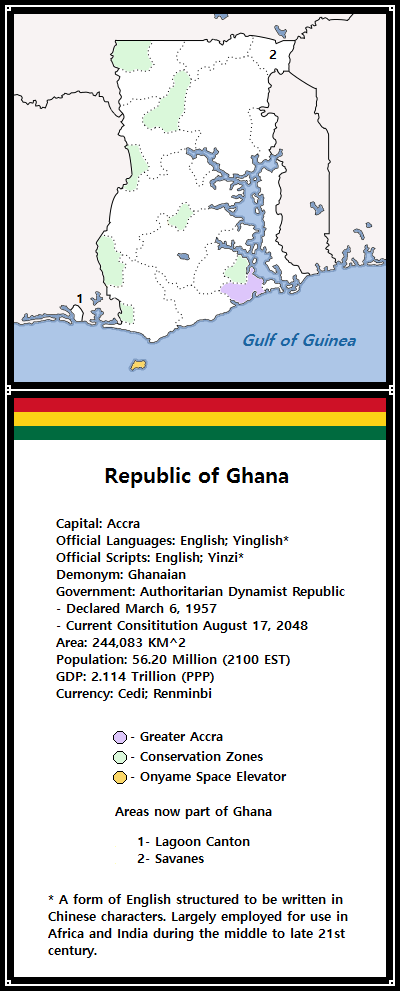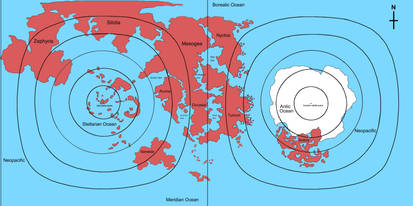Deviation Actions
Description
As the 22nd century dawns the nation of Ghana stands both as a testament to the ravages of climate change and the will of states to survive and reassert themselves in the face of catastrophe. In the early 21st century Ghana was a rising nation, but like many in West Africa was also one falling into the orbit of Nigeria and China. The nation was beset on all sides by foreign interests and the people found their ministers often bought and its parliament easily swayed by Abuja to the East.
This state of affairs would continue well into the middle 21st century, until disaster struck and nearly brought the nation down. The Gulf of Guinea saw increasingly violent storms and floods as the seas began to rise and the acidifying oceans crept on to the beaches and fisheries. Acidic ocean discharges, which tore into the Volta River and came ever closer to the Akosombo dam, became a looming problem, and in 2046 disaster struck.
When the Akosombo dam finally burst the waters violently spread north and south as decades of stored river water in Lake Volta and surging ocean tides swept past each other, churning up the coasts, dislodging rocks and loosening topsoil, and carving out a bay which ripped the nation in two. Black fly, which was once trapped inland, spread south down the new waterway, bringing malaria and river blindness to millions, ultimately falling upon the capital as well. The displacement of over two million people on the inland and the tearing up of fisheries and coastal soils as well led to a massive panic as hunger and starvation soared. As this unfolded the nation was plagued by blackouts as much of the electrical infrastructure which was built around Lake Volta was now destroyed. The nation began to descend into chaos, many of the old states and kingdoms which were a part of Ghana began to arm themselves in confusion, and civil war seemed certain.
It was at this point, that Ghana was, for lack of a better word, invaded. China and its allies on the continent swept in by way of armed intervention. Within just a week of the chaos the Nigerian navy was parked outside of Accara, within two weeks the Chinese Navy had moved into the new bay and surrounded the nation. Over the next two years a coalition drawn from West African nations, China, and Indonesia swept up any resistance on the mainland and secured the borders of Ghana. The coalition drew up a new constitution for Ghana along the lines of the “Dynamist” philosophy, a form of enlightened bureaucracy that had been aggressively pushed by China across the developing world. As what vestiges there were of democracy were stripped from this new Ghana the occupiers made sure to keep what corporate and political influence they had from the previous administration. Although the occupation technically ended with the drawing up of the new constitution in 2048 in actuality Ghana had been divided up into spheres of influence within which vast swathes of land and people were effectively under the rule of Ghana’s neighbors and an increasingly domineering China.
In many ways this would ironically be a godsend for Ghana decades down the road. As the bureaucracy solidified itself Ghana once again rose under the patronage of foreign actors that openly ran swaths of their country. This fostered a form of resentment amongst the local population, and the administration too, as time went on and people slowly forgot the crisis of the 2040s. From this resentment came a form of unity that Ghana had seldom seen before and what remained of internal dissent began to fade under a mutual hatred. When climate catastrophe struck their neighbors then, and Nigeria itself collapsed under the strain of desertification and acidification the Ghanaian administration knew exactly who and what to target, ransom, and nationalize, and had a united front amongst the populace to enact its will. As Nigeria and their neighbors fell or buckled under the stress of the ravaging climate Ghana began to take its land and resources back from the foreign nationals and would ultimately return the favor of its occupation.
In the late 2080s, with China being pushed out of West Africa and the neighboring nations of the Ivory Coast and Togo coming undone, Ghana took the initiative and fanned outward, occupying its neighbors and installing subservient dynamist regimes. Ghana as well took a lump of flesh as show of force, ripping the northern Savanes from Togo (and thus forcing Togo to depend upon Ghana for trade with inner Africa) and carving out a canton from the east of the Ivory Coast’s Greater Abidjan, securing a port to loom over the lagoons from which much of the nation’s coastal trade flowed. This brief war and occupation set the stage for the coming years. A new united Ghana had finally emerged on the scene and would make its presence known.
The 22nd century dawns and Ghana is, as of now, unchallenged across the Gulf of Guinea and the vast majority of coastal West Africa. While this position may be one day upended by the reforming states of Nigeria it does not trouble many, for in the mind of the common man any challenger from the East can be met with a blockade or a swarm of drones if need be, though the ruling bureaucracy looks further afield and is planning accordingly. The nation remains a destination for foreign interests and investors (and oddly enough on better terms with its former Chinese occupier than it was in the early 21st century), but now under the watchful eye of an extensive navy and an ever watchful and ever efficient bureaucracy. Seeking to maintain an edge economically, and partly as a prestige project, the Ghanaians have a massive feat of land creation to show for themselves. To the south is an artificial island the size of a small city, and striking upwards from its center are millions of strands of glittering carbon, the beginnings of a space elevator from which Ghana might extend its reach beyond the Earth.
In many ways, beyond the prosperity and strength of Ghana it is hard to tell the damage that was done to the nation in the last century. As weeds and blackflies died from the growth of the saltwater bay the health of the nation quickly returned, and as oysters and prawn spread along the bay the fisheries and life of the coasts returned. As Ghana was one of the first to be brought low by the changing climate it was thus one of the first to adapt to it, and now vast mangrove forests can be seen along the new estuaries of the inland and farms again dot the once turned up soils, though rice now vigorously competes with corn and yams. Many of the old occupied lands have been given over to environmental ministries and from orbit one can see the extensive conservation (and even reseeding) zones that Ghana has made.
Returning to the far south the space elevator project continues apace. Although Ghana is seen as a prosperous country one who chooses to look cannot deny the numbers. Its people are only so many, and it can only grow and reclaim itself so far if it is limited to its own borders. Indeed, many Asian nations of its own scope have economies multiples of the size of its own. If Ghana is to have a future when its neighbors reassert themselves it must be one step ahead of them. In space there as so many options, the waters of asteroids, the helium of the moon, the burning stretches of Mercury and Venus, and beyond. A workman has a dream of Ghana’s future potential. The Koreans have their renowned navies, the Chinese have their nimble trains, the Ethiopians have their endless airships and planes, and the Americans have their leviathan constructors. Maybe Ghana too can have such a symbol. Maybe one day one can say Ghanaian spaceships, no, starships in the same breath.
An alarm sounds. The workman’s break is over.
No more time for dreaming, it is time to work.


































